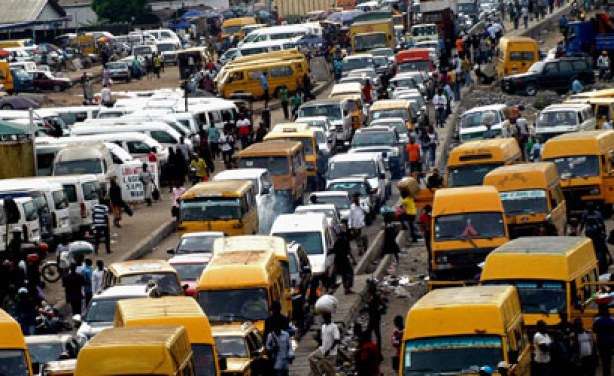
LAWLESSNESS reigns on Nigerian roads. Evidence of this reality is provided daily on the major highways and cities. When the Lagos-Ibadan Expressway was locked down for an entire day recently, the main reason was not just the bad portions of the road, ongoing reconstruction, broken down vehicles or religious activity: it was caused by manic drivers driving against the traffic, unchallenged, despite a multiplicity of members of law enforcement agencies. The federal and state governments should move urgently to enforce traffic laws to save lives and reverse the negative socio-economic effects of mayhem on the roads.
Daily, many vehicle drivers turn Nigeria’s 193,000-kilometre road network into death traps or a jungle. Traffic laws are broken with impunity: excessive speeding, drunk-driving, dangerous driving, overloading, along with bad tyres and flouting of traffic lights are common. Worse, driving against the traffic – “one-way” in local parlance – has become alarmingly routine. The situation in many cities is often described by locals and foreign visitors alike as “chaotic.” Lagos is notorious for its gruelling “go-slow,” the daily grinding slog in traffic to and fro work and business in the emerging megacity of 21 million persons.
But it is no longer alone in the gridlock experience: the phenomenon has caught up with most of our cities, including the Federal Capital Territory, Ibadan, Ilorin, Enugu, Onitsha, Owerri, the oil cities of Port Harcourt and Warri, Kano, Kaduna and Jos, among others. Lawless behaviour has also spiked, fuelled by a growing national culture of impunity, weak law enforcement and corruption.
True, our highways and inner city roads face traffic congestion as natural fallout of poor governance over the past four decades. As Babatunde Fashola, Minister of Power, Works and Housing, admitted, investment in road construction and maintenance has been very poor with only 28,980 km of roads paved by post-independence governments, out of the 193,200 km network. Maintenance has been poorer still and underlined, when attempts are made at all, by massive corruption, resulting in collapsed highways, bridges, potholes and craters, slow or grinding traffic within the cities and on the inter-state highways. Add the phenomenal rise in the number of vehicles plying the road, put at 11.4 million by the National Bureau of Statistics in a 2015 report, with 10.6 million as registered by the Federal Road Safety Commission. World Bank studies also found that cities with a vibrant, job-rich economy invariably end up with traffic congestion, which at a certain threshold, begins to hamper growth.
The FRSC says the slow-moving traffic is traceable to indiscipline and sheer recklessness. Research by the McMaster Institute of Transport and Logistics of the US says it slows down economic growth, job creation, causes stress and health problems, hinders deliveries and ambulance movement, among others. Lawlessness on the roads of Cairo, according to the World Bank, cost Egypt a loss of about four per cent of its GDP. In Lagos, it is said to cost $1 billion annually, while entrepreneur, Aliko Dangote, puts the losses to the economy from the Apapa-Oshodi Expressway and port roads gridlock at N140 billion weekly.
Nigeria needs massive investment in roads and highway infrastructure. This is an absolute minimum. However, we can no longer carry on as a lawless state. Drivers have run riot: even on major expressways. At the slightest slow down, drivers not only drive against the traffic, they occupy all the lanes, blocking all sides of the highway. For a whole day, sometimes spilling onto the following day, major road transport nodes are blocked. The missing link is enforcement: even Lagos State, which has spent so much on infrastructure, enacting new laws, creating and funding traffic and road transport agencies, is not fully enforcing its own ordinances. It relaxed the enforcement of the ban on commercial motorcycles on 475 out of its 9,100 roads who along with the commercial buses (painted yellow in Lagos), are wreaking havoc across the country.
With over 14 million registered and unregistered vehicles in the country, according to PwC, maintaining order on the roads is already fraught; failure to enforce laws makes it worse. The estimated eight million registered “okadas” and another 2-5 million unregistered ones plying the roads and tricycle operators known as Keke-Marwa in Lagos, notorious for recklessness, add to the bedlam. Nigeria contributes significantly to the 1.25 million persons that die worldwide each year in road traffic crashes. There were 9,694 RTCs in 2016, according to the FRSC, causing 5,053 deaths and 5,633 serious injuries.
Ours is not for lack of laws: indeed the FRSC enabling law and state laws impose harsher punishment than what obtains in Europe, while there are multiple enforcement agencies created by the states. A major problem here is corruption: the police, especially, are addicted to graft and instead of enforcing the law and bringing offenders to justice, solicit and extort bribes. This emboldens offenders and victimises the law- abiding. Another problem is habitual law-breaking by law enforcement agents and security personnel. Often, it is police, military officers, customs, immigration as well as public officials that are the first to drive against the traffic, disobey traffic lights and act with impunity.
The FRSC should demonstrate the capacity to enforce traffic laws with the use of technology. One such tool is the traffic camera to capture evidence of traffic violations such as running a red light. The system records the offence, accesses a fixed penalty ticket, and notice of intended prosecution that is then mailed to the owner of the vehicle that is involved. This will curb corrupt practices in road traffic management.
END

Be the first to comment